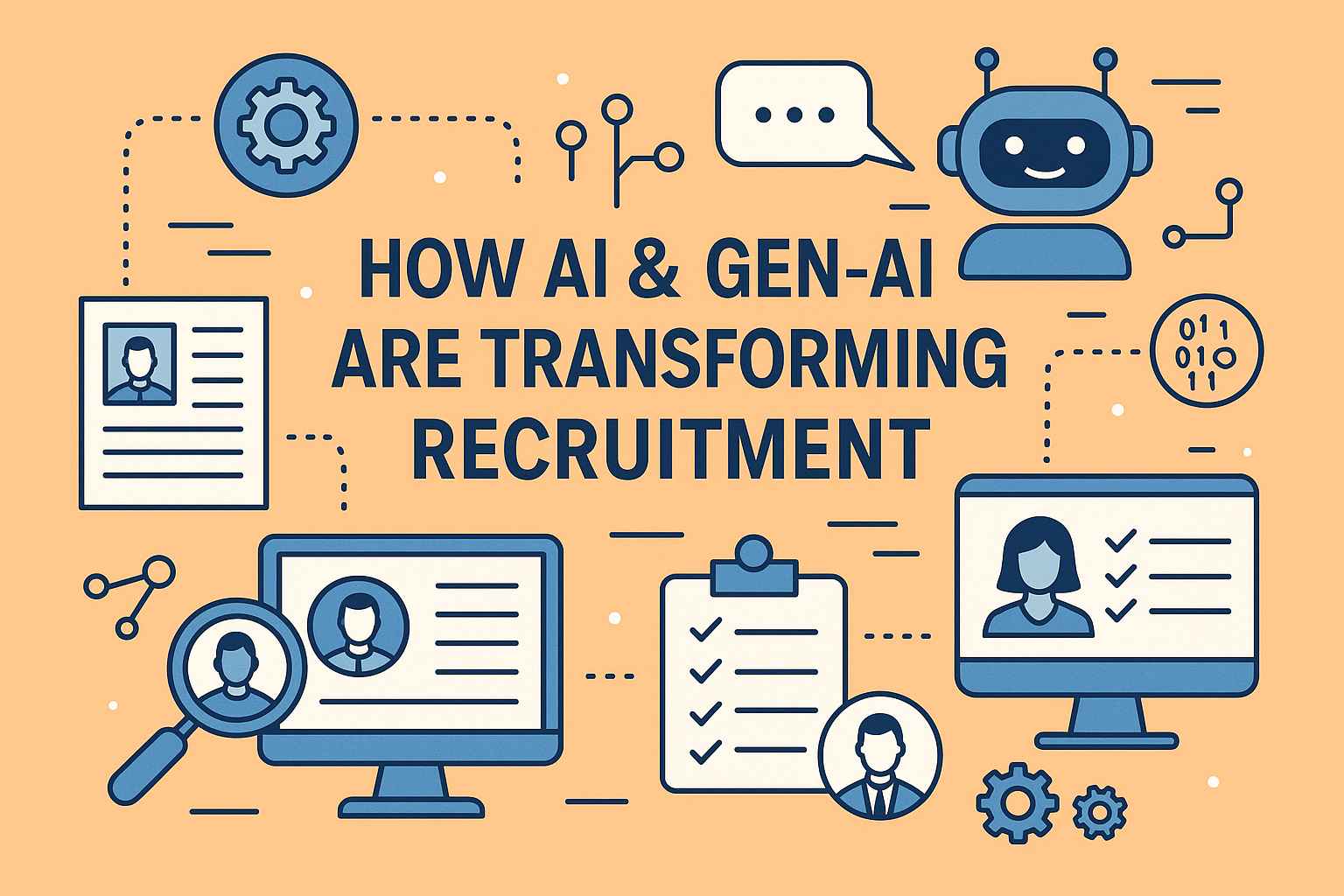The global hiring landscape is evolving faster than ever. Organizations across industries—technology, healthcare, finance, retail, manufacturing, and beyond—are adopting Artificial Intelligence (AI) and Generative AI (Gen-AI) to streamline and modernize their recruitment processes.
What once seemed like cutting-edge innovation is now becoming a standard expectation: AI-driven resume screening, chatbot-powered candidate conversations, automated interview scheduling, video assessment analytics, and predictive hiring insights.
Recruitment teams across the world are leveraging these technologies to hire faster, find better talent, reduce bias, and deliver a more engaging candidate experience. This article explores how AI and Gen-AI are transforming global recruitment, the benefits they bring, the challenges organizations must manage, and what the future of hiring looks like in 2025 and beyond.

1. Why AI Adoption in Recruitment Is Growing Worldwide
Across regions—from North America to Europe, the Middle East, and the Asia-Pacific—AI adoption is accelerating due to several global factors:
a. Rising Volume of Applicants
Remote and cross-border work has expanded talent pools, making it harder for recruiters to manually screen thousands of applications per role.
b. Pressure for Faster Hiring
In a competitive talent market, shortening the hiring cycle is a major priority.
AI tools can reduce time-to-hire by 30–60%.
c. Increased Focus on Skills
Global companies are shifting from degree-based hiring to skills-based hiring.
AI-powered tools help assess skills more objectively.
d. Need for Cost Efficiency
Recruitment automation reduces administrative workload and operational costs—key priorities in volatile global economies.
e. Evolution of Remote & Hybrid Work
Distributed teams require digital, automated, and intelligent hiring tools that can scale internationally.
2. How AI & Gen-AI Are Transforming the Global Recruitment Process
AI and Gen-AI are reshaping nearly every stage of the hiring cycle.
a. Automated Resume Screening
AI can analyze thousands of resumes in seconds, identifying candidates based on:
This helps recruiters focus on qualified candidates instead of manual sorting.
b. Intelligent Candidate Matching
AI-driven matching systems use advanced algorithms to suggest the most suitable candidates for each role, considering:
-
Skills
-
Career history
-
Job preferences
-
Performance predictors
This reduces mismatches and improves hiring accuracy.
c. AI-Powered Chatbots & Virtual Assistants
Chatbots now handle:
They operate 24×7, creating an efficient and smooth candidate experience.
d. Automated Interview Scheduling
AI tools sync calendars and automatically schedule interviews, saving time and reducing coordination delays.
e. AI-Enhanced Video Interviews
Modern video interview platforms use AI to analyze:
Although AI never replaces final decisions, it provides valuable scoring and insights.
f. Generative AI for Content Creation
Gen-AI tools automatically create:
This ensures consistent messaging and saves recruiters considerable time.
g. Personalized Candidate Engagement
Gen-AI personalizes communication such as:
-
Follow-up emails
-
Interview prep guides
-
Status updates
-
Offer-stage messaging
A personalized experience dramatically improves employer brand perception.
h. Predictive Hiring Analytics
AI uses historical data to predict:
This shifts recruitment from reactive to strategic planning.
3. Global Benefits of Using AI in Recruitment
AI and Gen-AI bring measurable advantages to organizations worldwide.
1. Faster Hiring Processes
Automation removes manual bottlenecks, enabling recruiters to hire more efficiently.
2. Higher Quality of Hire
AI evaluates candidates objectively based on multiple data points, improving overall hiring outcomes.
3. Enhanced Candidate Experience
Chatbots, faster responses, and smoother workflows create a professional and engaging journey.
4. Reduced Operational Costs
AI reduces the need for repetitive administrative work, lowering recruitment expenses.
5. Reduced Bias
When properly trained, AI tools help reduce unconscious bias in screening and shortlisting.
6. Data-Driven Decision Making
Dashboards and AI analytics offer global hiring teams valuable insights to improve processes.
4. Challenges of AI in Recruitment
Despite its benefits, AI adoption comes with challenges that global HR teams must address.
a. Algorithmic Bias
If AI systems use biased historical data, they may replicate patterns of discrimination.
b. Lack of Transparency
Candidates may not understand how AI influences their evaluation, raising concerns about fairness.
c. Privacy & Compliance
Organizations must follow global data privacy regulations such as:
d. Balance Between Automation & Human Interaction
AI should streamline processes, not replace human judgment or empathy in recruitment.
5. How Recruitment Platforms Can Use AI to Stay Competitive
Recruitment portals can integrate AI in several valuable ways:
a. Smart Candidate Recommendations
AI can match job seekers to relevant jobs automatically.
b. Skill-Based Search & Scoring
Candidates receive a skill score, improving credibility and match relevance.
c. AI-Powered ATS Systems
End-to-end automation simplifies workflows for employers globally.
d. Gen-AI Resume Builders
Helps job seekers create strong profiles that align with modern hiring standards.
e. Automated Job Description Generators
Ensures clear, consistent, and inclusive job postings.
f. Predictive Workforce Insights
Helps organizations anticipate hiring cycles and talent shortages.
6. The Future of AI-Driven Recruitment (2025 & Beyond)
The next wave of AI innovation in recruitment will include:
-
AI-driven role-specific assessments
-
Voice-based interview intelligence
-
Predictive cultural fit indicators
-
AI-driven career path mapping
-
Fully automated first-round interviews
-
Real-time recruiter copilots integrated into ATS platforms
As AI continues to evolve, the role of recruiters will shift from administrative work to strategic, people-centric functions—focusing on relationship-building and decision-making.
Conclusion
AI and Generative AI are redefining recruitment on a global scale. From automated screening to predictive analytics and personalized communication, these technologies offer powerful advantages that help organizations hire faster, smarter, and more objectively.
While challenges around ethics, privacy, and bias remain, responsible and thoughtful implementation ensures AI becomes a transformative force for recruiters, job seekers, and hiring teams worldwide.
In the future, AI won’t replace recruiters—it will empower them to focus on the human side of hiring.
|